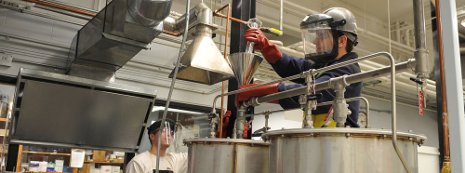Application of surface chemical fundamentals to improving industrial filtration rates
Document Type
Article
Publication Date
5-14-2019
Abstract
The throughput of any process is limited by the step with the lowest throughput. In iron ore processing, filtration is used to dewater the iron ore concentrate created during reverse flotation. The conditions of the reverse flotation of iron ore and the efficient filtration of iron ore concentrate are found to be at odds with each other. We show that optimizing the filtration conditions should reduce cation retention in the filter cake, which also improves pellet quality in laboratory scale work. Experimental work was performed to investigate potential implementations at plant scale. Based on data collected at operating magnetite concentrators, it has been found that adding CO2 into the filter slurry can increase filtration rates dramatically. In plant scale work, filtration rates were increased by up to 23.7% with the addition of 0.54kg of CO2/ton of feed. We compare these results with laboratory scale results on the same process and elaborate on the theory leading to this discovery, while considering its potential impact on final pellet and iron product quality.
Publication Title
Mineral Processing and Extractive Metallurgy Review
Recommended Citation
Kawatra, S. K.,
&
Claremboux, V.
(2019).
Application of surface chemical fundamentals to improving industrial filtration rates.
Mineral Processing and Extractive Metallurgy Review,
40(4), 292-297.
http://doi.org/10.1080/08827508.2019.1598404
Retrieved from: https://digitalcommons.mtu.edu/chemical-fp/15


Publisher's Statement
© 2019 Taylor & Francis Group, LLC. Publisher’s version of record: https://doi.org/10.1080/08827508.2019.1598404